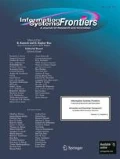Abstract
In this paper we argue for an experientially grounded view of IT professionals’ ethical formation and support. We propose that for such formation and support to be effectual, it should challenge professionals’ conceptualisations of their field and of ethics, and it should do so with the aim of changing their experience. To this end, we present a Model of Ethical IT, which is based on an examination of the nature of ethics and on empirical findings concerning IT professionals’ experience of ethics. We argue that for IT professionals to be enabled to become more ethical in their practice: the purpose of IT must be primarily understood to be user-oriented; the nature of professional ethics must be primarily understood to be other-centred; and the goal of ethics education must be understood as primarily promoting a change in awareness.



Similar content being viewed by others
References
Alter, S. (2003). 18 reasons why IT-reliant work systems should replace “The IT artifact” as the core subject matter of the IS field. Communications of AIS, 12, 365–394.
Brigham, M., & Introna, L. D. (2007). Invoking politics and ethics in the design of information technology: undesigning the design. Ethics and Information Technology, 9(1), 1–10.
Bruce, C., Pham, B., & Stoodley, I. (2004). Constituting the significance and value of research: views from information technology academics and industry professionals. Studies in Higher Education, 29(2), 219–238.
Burnett, K., & Subramaniam, M. M. (2004). Defining the information technology workforce from the educational perspectives: a pilot study. Paper presented at 5th Conference on Information Technology Education, Salt Lake City, UT, USA.
Bynum, T. W., & Rogerson, S. (2004). Codes of ethics: Editors’ introduction. In T. W. Bynum & S. Rogerson (Eds.), Computer ethics and professional responsibility (pp. 135–141). Malden: Blackwell.
Cronan, T. P., & Douglas, D. E. (2006). Toward a comprehensive ethical behavior model for information technology. Journal of Organizational and End User Computing, 18(1), i–xi.
Davis, C. (1996). Levinas: An introduction. Cambridge: Polity.
Denning, P. J. (2004). The field of programmers myth. Communications of the ACM, 47(7), 15–20.
Denning, P. J., & Dunham, R. (2003). The missing customer. Communications of the ACM, 46(3), 19–23.
Dertouzos, M. (2002). The unfinished revolution: Human-centred computers and what they can do for us. New York: HarperCollins.
Dreyfus, H., & Dreyfus, S. (1990). What is morality? A phenomenological account of ethical experience. In D. Rasmussen (Ed.), Universalism vs. Communitarianism: Contemporary debates in ethics (pp. 237–264). Cambridge: MIT.
Edwards, S. L., & Bruce, C. (2004). The assignment that triggered change: assessment and the relational learning model for generic capabilities. Assessment & Evaluation in Higher Education, 29(2), 141–157.
Ellis, R., & Lowell, B. L. (1999). Core occupations of the U.S. information technology workforce. http://206.67.48.105/IT-1.pdf Accessed May 1, 2009.
Finkelstein, L., & Hafner, C. (2002). The evolving discipline(s) of IT (and their relation to computer science): A framework for discussion. http://www.cra.org/Activities/itdeans/finkelstein.pdf Accessed May 1, 2009.
Floridi, L., & Sanders, J. W. (2002). Mapping the foundationalist debate in computer ethics. Ethics and Information Technology, 4(1), 1–9.
Floridi, L., & Sanders, J. W. (2004). On the morality of artificial agents. Minds and Machines, 14(3), 349–379.
Gilligan, C. (1982). In a different voice: Psychological theory and women’s development. Cambridge: Harvard University Press.
Grodzinsky, F. S. (2000). The development of the ‘ethical’ ICT professional: and the vision of an ethical on-line society: how far have we come and where are we going? Computers and Society, 30(1), 3–7.
Grodzinsky, F. S., Miller, K. W., & Wolf, M. J. (2008). The ethics of designing artificial agents. Ethics and Information Technology, 10(2–3), 115–121.
Kaarst-Brown, M. L., & Guzman, I. R. (2005). The IT professional: Who is “the IT workforce”?: Challenges facing policy makers, educators, management, and research. Paper presented at ACM SIGMIS Conference on Computer Personnel Research, Atlanta, Georgia, USA.
Koehn, D. (1994). The ground of professional ethics. London: Routledge.
Kohlberg, L. (1981). Essays on moral development, Volume 1: The philosophy of moral development. San Francisco: Harper & Row.
Levinas, E. (1998). Entre nous: On thinking-of-the-other. London: Athlone.
Marton, F., & Booth, S. (1997). Learning and awareness. Mahwah: Erlbaum.
Marton, F., & Pang, M. F. (2006). On some necessary conditions of learning. The Journal of the Learning Sciences, 15(2), 193–220.
Munro, K. I., & Cohen, J. F. (2004). Ethical behaviour and information systems codes: The effects of code communication, awareness, understanding, and enforcement. Paper presented at 25th International Conference on Information Systems, University of Virginia, Charlottesville, Virginia, USA.
Orlikowski, W. J., & Iacono, C. S. (2001). Research commentary: desperately seeking “IT” in IT research—a call to theorizing the IT artifact. Information Systems Research, 12(2), 121–134.
Pang, M. F., & Marton, F. (2003). Beyond “lesson study”: comparing two ways of facilitating the grasp of some economic concepts. Instructional Science, 31, 175–194.
Schweiker, W. (2004). The Blackwell companion to religious ethics. Oxford: Blackwell.
Stahl, B. C., Wood, C., & Howley, R. (2004). Teaching professional issues in computing through the development of a student code of conduct. Ethicomp 2(1). http://www.ccsr.cse.dmu.ac.uk/journal/home.html Accessed May 1, 2009.
Stoodley, I. (2009). IT professionals’ experience of ethics and its implications for IT education. Doctor of Philosophy Thesis. Queensland University of Technology, Brisbane, Australia.
Tavani, H. T. (2004). Ethics and technology: Ethical issues in an age of information and communication technology. Hoboken: Wiley.
Vartiainen, T. (2005). Moral conflicts in a project course in information systems education. Doctor of Philosophy Thesis. University of Jyväskylä, Department of Computer Science and Information Systems, Jyväskylä, Finland.
Volkman, R. (2004). Being a good computer professional: The advantages of virtue ethics in computing. Ethicomp 2(1). http://www.ccsr.cse.dmu.ac.uk/journal/ Accessed May 1, 2009.
Acknowledgements
This article draws on research supported financially through a Queensland University of Technology Capacity Building Award.
Author information
Authors and Affiliations
Corresponding author
Rights and permissions
About this article
Cite this article
Stoodley, I., Bruce, C. & Edwards, S. Expanding ethical vistas of IT professionals. Inf Syst Front 12, 379–387 (2010). https://doi.org/10.1007/s10796-009-9207-7
Published:
Issue Date:
DOI: https://doi.org/10.1007/s10796-009-9207-7




